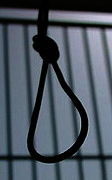Our Life Depends on Executions
» Iran’s Chief Justice:
Iran’s Chief Justice, ayatollah Mohseni Gorkani said, “Our life, tranquility and peace depend on executions and ghesas” (loosely translated as retaliatory punishment).
Mehr news agency reported that the ayatollah made these remarks in his ethics class without stating where exactly the class was held. According to Mehr during the cleric’s class, the chief justice first read a verse from the Quran about executions and ghesas, and then added, “The issue of executions and ghesas that the Quran dictates, are what our life, tranquility and peace depend on.”
The number of recent executions in Iran has risen to such high numbers that even foreign governments and international human rights organizations have issued protesting statements calling on the Iranian government and authorities to stop the executions.
Officials of the Islamic republic on the other hand maintain that most of the recent executions are related to criminals involved in narcotics crimes and the murders. Ramin Mehmanparast, the spokesperson for Iran’s foreign ministry also said that 80 percent of those who were hanged in the country were individuals who had criminal acts related to narcotics.
In this regard, Iran’s chief justice recently confirmed this and said, “The issue of drugs is a calamity that has been spread by colonialism which is slowly killing our youth.”
He has expressed satisfaction that such cases were dealt with rapidly, carefully and with a firm hand adding that when a court issues the right sentence on this the court upholds the judgment.
Gorkani thanked the judges and staff of the judiciary branch for their “work” and said that some in the judiciary did not appreciate the work of the branch adding, they “do not understand that the current security in the country is in the hands of the judges of the judiciary.” He further said that the “judges and judiciary staff spent all their efforts to protect rights and institutionalize security in society.”
Iran’s supreme court is the highest judiciary body in the country which can also examine the violations of the president based on his legal responsibilities.
According to official reports, during the month of January alone some 66 individuals were executed in Iran, while some human rights activists maintain that the actual numbers are much higher.
Just a few days ago Mir-Hossein Mousavi and Mehdi Karoubi, the two leaders of Iran’s opposition movement known as the Green Movement protested against “the large number of executions in the country and the speedy execution of the sentences which are carried out without the complete implementation of due process” and attributed this to the unthoughtfullness of the leaders and the creation of terror in society. They both said that the full implementation of civil procedures in the country was the legal and religious rights of all Iranians.
According to Karoubi and Mousavi, “Does the execution of some 300 individuals in the last year not bring anything but fear and horror to society causing Iran to become even more isolated on the international scene.” They both questioned whether these speedy trials and executions were Islamic and called for their suspension.
They also condemned the recent refrainment of officials from returning the bodies of executed individuals to their family members. In the first 40 days of this year, the Islamic republic is said to have broken the world record for the number of executions in such a short span of time.
On Sunday Human Rights Watch issued a statement expressing its concern for the rise in executions in Iran. The director of the Middle East division of Human Rights Watch Sarah Leah Whitson told the French news agency that Iran could execute over a thousand people should the present trend continue.
Prior to this year, China and then Saudi Arabia held the records in the number of annual executions, giving Iran the third place. It should be noted that China’s populations is almost 20 times higher than that of Iran. In its annual report, Human Rights Watch’s has reported that with the increase in the number of executions, torture and terror, the situation in Iran has become worse than ever.
Prior to the HRW report, the US and EU also had issued statements expressing their grave concern for the rate of executions in Iran. On Wednesday, the UN High Commissioner for Human Rights Navi Pillay also issued a similar concern over the executions in Iran. Her statement said that she had repeatedly asked the Iranian authorities to stop the executions and expressed her disappointment that her concerns had gone unheeded. She said that different countries around the world were generally moving towards ending executions as a form of punishment and that she had requested that Iranian authorities too stop the practice and take measures to end the practice altogether.
Opponents of the Iranian regime and human rights activists contend that Iranian authorities have engaged in mass executions of political prisoners on the pretext of labeling them drug offenders or murderous criminals. They compare the current spike in the number of executions to those that were carried out in late 1980s when thousands of political prisoners were tortured and executed belonging to the different political groups.


